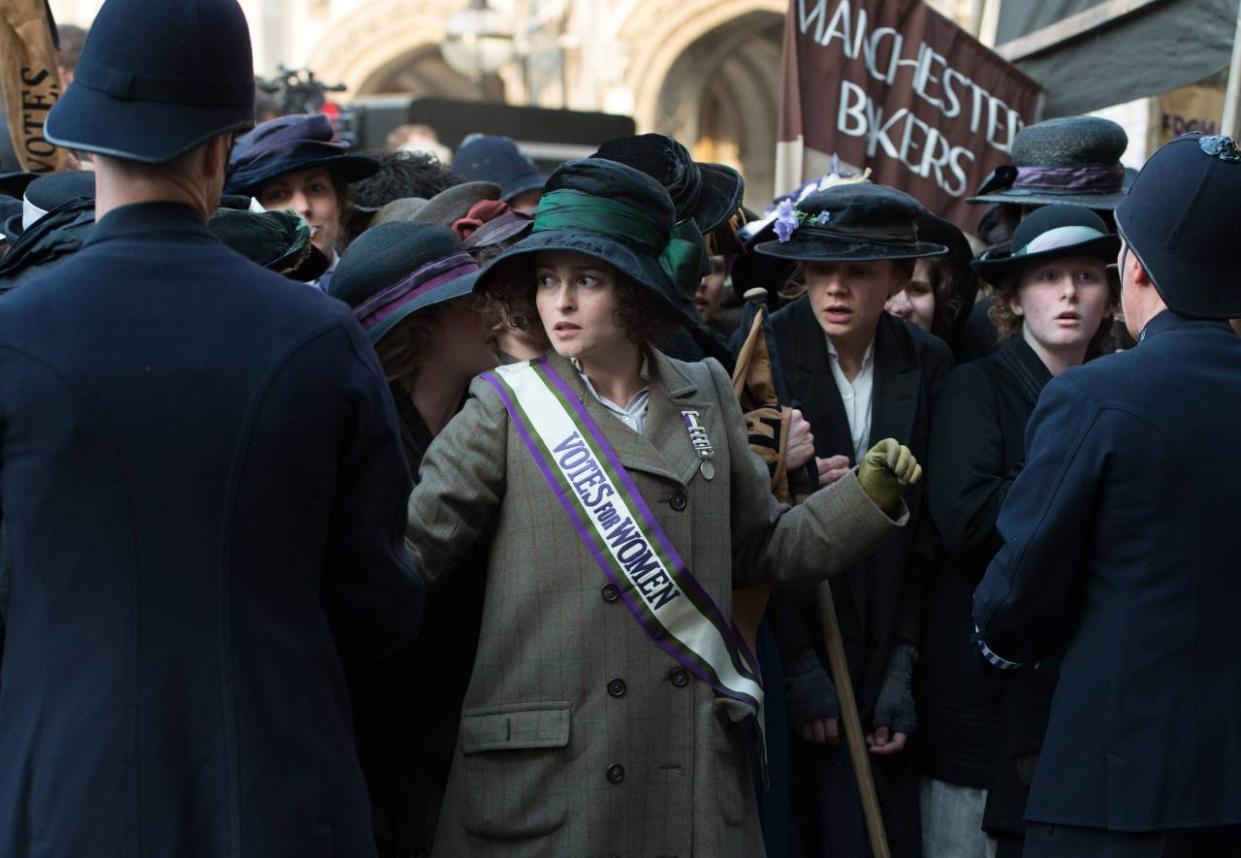‘Suffragette’ Director Sarah Gavron Welcomes the Controversy

Helena Bonham Carter in Suffragette. Photo: Focus Features
Earlier this month, several cast members from Suffragette, including Meryl Streep and Carey Mulligan, donned T-shirts with the slogan “I’d rather be a rebel than a slave.” It’s a reference to a quote from real-life suffragette Emmeline Pankhurst, who is portrayed by Streep in the film. But the backlash was sudden and furious — Twitter was alight with cries of racial insensitivity and activists claimed that Streep “has to know better. And if not, her publicist should have.” This type of rash reaction can typically make or break a film, but for director Sarah Gavron, the conversations were not only welcomed but encouraged.
“It’s opened up a really important discourse I think,” Gavron told Yahoo Style during a recent press day in Los Angeles. “I completely get and understand the sensitivities around that issue, particularly in the U.S. The history of the moment is interesting because in the U.S. you had immigration on a large scale and there were lots and lots of women of color involved in the movement, some included and some horribly excluded. In the U.K. we didn’t have that story. We didn’t have immigration on that scales and it was in the 1950s that we got this brilliantly diverse Britain of today.” She added, “It’s meant to be a good, positive force for discourse about inequality. It would be a shame if that [shirt] overshadowed the intentions of the film.”
Suffragette follows a group of British working class women fighting for their right to the vote with protest, activism, and militancy. The filmmakers, including Gavron and screenwriter Abi Morgan, created a composite protagonist, played by Mulligan, who finds her voice and rallies other disenfranchised working women to do the same.
“You can find equivalents to her in the research, but it gave us a little bit of artistic freedom to create the arc we wanted and released us from the idea of biopic,” Gavron explained of Mulligan’s laundress Maud Watts. “We also thought that with working women their voices sounds really contemporary. The issues they were dealing with were so relatable, like the pay gap, lack of rights to educations, lack of parental rights, sexual abuse in the workplace.”
“T-shirt gate” was not the only riotous moment leading up to the release of the film (in theaters today). At the movie’s recent London premiere, activists from Sisters Uncut, staged a lie-in on the red carpet as a means of bringing awareness to domestic violence funding. “That was really good!” Gavron said enthusiastically. “It was so in the spirit of the film. This is a film that’s meant to alert people to 21st century issues that are ongoing. It was entirely appropriate that they took advantage of the press assembled there. What a great thing for the Suffragette premiere.”
Having that type of contemporary resonance was key for the director, who would have made this film several years earlier if she hadn’t come across complications of her own.
Part of the delay was that she didn’t want to make a movie about history just for history’s sake. “We focused on this period when militancy and civil disobedience was at its height for women,” she says. “There were things that echoed with the modern world, like police surveillance, people being attacked by police during protests, hunger striking as a way of political protest. It seemed like the right time to make the film and it could connect with the world today. And especially since young people need to vote and they need to vote in this country with the election coming up.”
Another issue was convincing studios that there was an audience for Suffragette, and that they should invest in a female-driven story about women’s rights. “It definitely wasn’t an easy proposition,” Gavron admitted. “It took a long time to get it up and running, and it fell down a few times. We were lucky in that in the film industry people were becoming more vocal about inequity and imbalance and the lack of female stories. Feminism was more in the ether.”
All of the actresses jumped at the chance immediately, beginning with Mulligan and followed by Helena Bonham Carter. The issue became casting actors in the male roles, which are strong but secondary to the plot. It turns out that Hollywood men aren’t used to being asked to play second fiddle to a bunch of women. “The agents kept ringing back saying ‘There’s not really enough for them to do. They’re just playing husbands,’” Gavron laughed.
Most important, though, was Streep, who appears in the film for all of five minutes. Despite her role essentially being a cameo, the actress has been a big part of the marketing and promotion for Suffragette (even though she recently claimed she does not consider herself to be a feminist).
“We thought, ‘Who could that be? Let’s get an iconic actress,’” Gavron recounted. “Carey Mulligan was on a walk with her mum and her mum said, ‘You should get Meryl Streep.’ So she rung us and said she thought she was right. We thought, ‘Do we dare ask Meryl?’ But we did and she came onboard, which was great because not only is she such a great actor, but she’s such a great advocate for women’s rights in the industry and outside of it.”
Women are clearly onboard for the film, as revealed in the casting process, but what about male viewers? “I hope with this film publicity or word of mouth will encourage men to see it and they’ll realize it’s a human story,” Gavron said. “It’s a story that relates to everybody. Equality is good for everyone. It’s not just good for women – it’s good for everybody.”
Follow us on Facebook, Instagram, and Pinterest for nonstop inspiration delivered fresh to your feed, every day.

